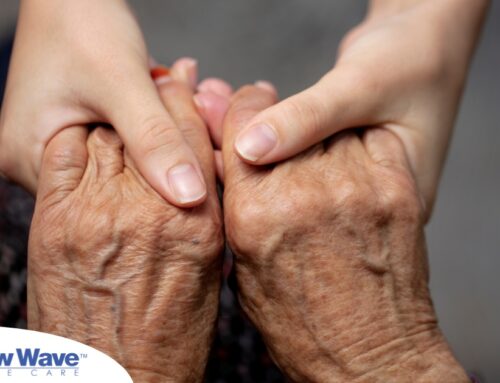Caring for a loved one undoubtedly adds a mixed bag of emotions to the caregiving process. Not only does assisting an aging family member make you witness to any challenges they face, but you maintain a personal and sometimes painful connection to them while also navigating the difficult world of senior health care and wellness. Perhaps one of the most disheartening circumstances as a caregiver is when your help goes unappreciated, or even worse, unwanted. In caring for an elderly family member, you might carry out tasks for your loved one without any acknowledgement or thanks. Sometimes older adults flat out resist care altogether. It is not uncommon to witness your loved one reject the care of professional care services, or even protest against help offered by you or other members of your family.
When an elderly family member resists the care they need, this can bring on a stressful combination of emotional and logistical struggles; not only is it extremely saddening when a loved one pushes you away, but it can be scary seeing them resist help when your main concern is their wellbeing. Caregivers often experience frustration when trying to convince an elderly adult to receive care. It can be hard to rationalize your loved one’s behavior when everyone else can clearly see that they are in need of care services. The reality is, however, that even seniors who obviously need help navigating daily life often refuse assistance. When caregiving becomes more of a combative attempt than a cooperative partnership, you might want to consider some approaches to de-escalating the situation and helping your loved one come to accept the care they need.
Why Seniors Might Resist Care
Elderly adults tend to resist care for a variety of reasons, but one common factor that often contributes to a seemingly stubborn attitude amongst seniors is change. Most seniors experience change in their surroundings or abilities, and a loss of things familiar to them, to some degree or another. They may have to move from the comforts of a lifelong home to a care facility, they may lose their sense of independence in day to day tasks, or experience loss on a psychological level with Alzheimer’s or dementia. All of these changes can lead seniors to resist help from those around them. Elderly adults may struggle cultivating trust even for caregivers with the most loving intentions, out of fear of these various types of changes that often become a reality in old age.
In better understanding your loved one’s struggle to accept care, it is important to evaluate what factors are unique to their situation as a care receiver. For instance, certain disabilities or diseases may contribute more strongly to the experience of paranoia or distrust in seniors and therefore give you some insight into why they are resisting your help. Assessing one’s physical abilities and the level of mobility they maintain is also an important consideration.
Here is a list of common factors to consider if your elderly loved one is resisting care:
- Alzheimer’s and Dementia – Alzheimer’s and dementia patients deal with short term memory loss, which often leads to feelings of fear and vulnerability as they may struggle to recall their surroundings or even the names or faces of their caretakers. Dementia patients commonly resist care as memory loss makes it difficult to place trust in others, let alone remember why they might need assistance in the first place.
- PTSD – Unfortunately, much of our population suffers from PTSD, and often times it goes untreated. If you have an elderly parent or loved one who struggles with PTSD, it probably makes it more difficult for them to accept care. Those with PTSD often feel on guard, emotionally distant, guilty, and helpless about their situation. As adults with PTSD become older, these feelings can escalate even more as the thought of having to rely on others triggers their symptoms.
- Pride – Many seniors expect that receiving care means also having to sacrifice their own pride or dignity. This can be especially common in those who receive care from their adult children, as it can feel like a role reversal or as if they are showing a sign of weakness in front of their children.
- Fear of burdening – Along with the notion that accepting help might show weakness, Seniors also tend to fear that their care needs are too much of a burden for those around them. Your loved one may act resistant to your offers of support thinking they are acting in your best interest. Ironically, this struggle between caregiver and care receiver usually causes the caregiver more stress.
- The disparity between physical ability and cognition – People often refer to elderly people who maintain their memory and awareness as “sharp”. Many elderly adults maintain this mental “sharpness” while still experiencing the physical side effects of aging, which can cause frustration as their body can no longer keep up with what their mind wants to do. Oftentimes seniors who need strictly physical assistance have a hard time coming to terms with their need for caregivers. They might equate the physical assistance they receive with a sort of invalidation of their intellect. Seniors in this situation often explain their perspective like they feel as if they are being babysat, and resort to rejecting care in order to assert their independence.
- Loss of a spouse or other loved one – A traumatic loss later on in life can leave elderly adults with a feeling of hopelessness. If your loved one has recently lost a spouse or someone else close to them, they may feel symptoms of depression that make them extremely unmotivated as well as withdrawn from others. This could explain a disinterest in accepting elderly care.
How to Encourage Your Loved One to Accept Care
Approaching a Conversation about Caregiving
After taking careful consideration of your loved one’s circumstances, you will need to determine how you can be most effective in hopefully working with your loved one to accept the care they need. Although considering care options may be a conversation you do not want to have with them, it is important to talk with them about developing a care plan before they are left without the resources or help they need. If you act as the primary caregiver, you might want to work with them on how to make the caregiving process as easy and enjoyable as possible for the two of you. Or, you might find yourself overwhelmed with caregiving responsibilities and needing to turn to outside caregiving assistance. Either way, if your loved one is prone to resisting care you will want to approach the situation in a manner that leads to progress rather than argument.
- Talk in the right place, at the right time – Start the conversation when both of you are relaxed and comfortable. Your loved one will most likely be more receptive to your concerns and suggestions about caregiving when they are relaxed, instead of bringing up the topic in the midst of an argument or during a stressful time.
- Ask them about their preferences – Asking your senior for their opinions and preferences in caregiving options will help them feel like their voice is being heard. Allowing them to voice their wishes and concerns will likely cut down on their resistance as well; they will be less likely to reject your efforts if they do not feel like you are simply taking control of the situation, but rather listening to them along the way.
- Determine what services your loved one needs – Before talking to them, determine realistically what type of care your loved one needs. It is possible that your honest assessment will conclude that they need a greater degree of assistance than they are willing to admit, but it is important to have a clear idea in your head of what forms of care you are aiming to incorporate in your loved one’s life.
- Consider what is attainable – It is important to carefully consider what care services you and your family can realistically provide for your loved one. You may feel that some professional care services are too financially out of reach for around the clock care, or on the contrary come to the realization that you do not have enough time away from other responsibilities to be a full time caregiver for your loved one. Consider both financial and logistical limitations as to what you can do for your loved one in terms of their care needs. Unfortunately, this may not always match up with what your loved one wants from a caregiver. It can be disheartening when you are not able to meet your loved one’s hopes about caregiving, but ultimately both sides will have to accept a realistic view of what you can achieve with elderly care.
- Be careful not to make the conversation overwhelming – Try not to make your loved one feel bombarded or overwhelmed. Stay level headed, speak calmly, and make sure your concerns are coming across clearly. Becoming angry or overly emotional can give your loved one the impression that they are to blame for the situation, which is counterproductive. If your loved one suffers from memory loss or other cognitive issues, you should make an extra effort to speak in simple, clear sentences so that they do not become confused or overwhelmed.
- Turn to family and friends for help – Enlisting the involvement of other family and friends might help make your efforts to provide care for your loved one more effective. Having a group of people encourage your senior to accept the care they need will probably make a larger impact on them than hearing the same thing from just one person.

Strategies in Resistant Situations
After talking with your elderly loved one about accepting care, you hopefully have ironed out a caregiving approach that is more suited for your loved one. You may see them being more receptive to care after talking with you and working together on the issue. However, you may find yourself in isolated situations where you still struggle to give your loved one care without conflict. This can happen in situations of heightened stress, if they have been experiencing increased amounts of change, or if their memory loss increases.
Here are some strategies you can practice in situations when your loved one is acting especially resistant to care:
- Describe caregiving positively – Change the connotation of the way you speak about caregiving in order to make your loved one more open to it. For instance, you can present respite care to them as a fun part of their week in which they get to do special activities. Or you can explain to them that accepting help from others will allow them to have more leisure time and spend less time doing chores or tiring themselves out.
- Try trial runs – If you wish to consult with professional caregivers, do not make your loved one commit to one type of care at once. Let them test out care with a certain facility for a short time without locking them into any specific payment plan or program. Most companies offer a grace period for trials like this to reduce senior’s fear of committing to a caregiver not suited for them.
- Collaborate with outside caregivers – If your loved one has regular caregivers other than you or your family, make sure both you and your senior are comfortable with their professional caregivers. Keep in contact with their regular caregivers, and help make your elderly loved one feel comfortable if new caregivers ever begin working with them. Helping them to establish trust with their caregivers will make it easier for them to accept care.
- Address financial concerns – Many elderly adults worry about the financial aspect of their health needs. They may protest using professional services because they worry about the costs associated. Remind them that not only do they fully deserve the care they need but that there are many programs that make professional care accessible and affordable. If you want more information on financing options for care, feel free to contact New Wave Home Care for guidance.
- Help them help you – Ironically, your senior may resist care out of fear of being burdensome, but oftentimes this behavior can make your job as a caregiver even more time consuming and stressful. If your loved one is capable of having this conversation, express to them carefully and kindly that their resistance only makes your job harder. Help them understand that cooperation is the most helpful thing they can do for your.
- Pick your battles – Ultimately, some arguments are more important than others. You should obviously intervene if your loved one’s resistance to care is jeopardizing their immediate wellbeing. However, with smaller disagreements, it is sometimes better to keep quiet and avoid fighting with your loved one.
Remember to Accept Care for Yourself
At the end of the day, every caregiving situation relies upon a unique set of circumstances. While learning some best practices for approaching a senior resistant to care can be helpful, it is not foolproof. If your elderly loved one is stubborn or more intensely mistrusting of their caregivers, there is no ultimate strategy for creating a completely harmonious caregiver/care receiver relationship.

This reality can be difficult for loving family members. If you provide care or coordinate care for you loved one, seeing them resist care can make your job stressful and emotional. If you feel helpless, or even fearful that your efforts to convince your loved one to accept are not working, do not struggle with the situation on your own. In the struggle to provide care for those that you love, remember to accept help and assistance for yourself as well. Talk to your family, friends, and professional care services near you that can help. Always feel free to consult New Wave Home Care for any questions or needs you might have, and call (626) 466-9470 at any time of the day or night.
Sources:
- https://www.mayoclinic.org/healthy-lifestyle/caregivers/in-depth/caring-for-the-elderly/art-20048403
- https://www.seniorliving.org/research/ptsd-aging-adults/
- https://blog.caregiverhomes.com/tips-for-dealing-with-stubborn-elderly-parents-with-dementia-50-expert-tips-for-communicating-gaining-cooperation-understanding-behavior-and-more







